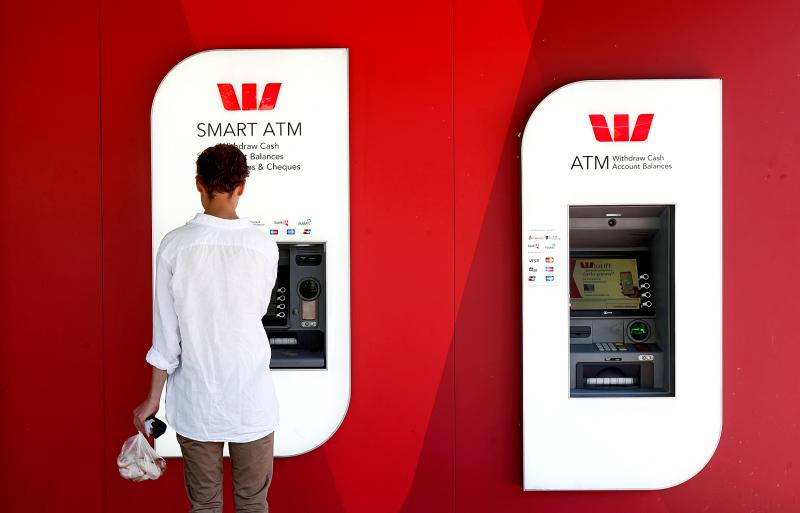Westpac Banking Corp is to pay a record A$1.3 billion (US$916 million) fine to settle Australia’s biggest breach of money laundering laws, capping a saga that shredded the bank’s reputation and cost former CEO Brian Hartzer his job.
The fine, the largest levied against an Australian company, is more than the A$900 million Westpac had set aside for a potential penalty, and almost double the A$700 million that rival Commonwealth Bank of Australia paid to settle its own money-laundering breaches in 2018.
In reaching the agreement, Westpac admitted to about 76,000 additional breaches on top of the 23 million contraventions in the original suit, the Australian Transaction Reports and Analysis Centre (AUSTRAC) said in a statement yesterday.

Photo: EPA-EFE
These included failing to monitor customers for transactions related to possible child abuse, or conducting adequate risk assessment of overseas banks.
The settlement closes a sorry 10-month chapter in the history of Australia’s oldest bank. In the immediate aftermath of the suit, intense investor pressure led to Hartzer’s resignation and the early retirement of Lindsay Maxsted as chairman.
An investigation excoriated the lender for an “immature and reactive” risk culture, and found staff lacked the skills, expertise and experience to effectively manage risk.
The agreement comes with the global financial industry again falling under the spotlight after a cache of leaked documents showed years of transactions handled by the world’s largest banks linked to money laundering, corruption and fraud.
Westpac’s settlement “sends a strong message that AUSTRAC will take action to ensure our financial system remains strong so it can’t be exploited by criminals,” AUSTRAC chief executive Nicole Rose said in a statement. “Our role is to harden the financial system against serious crime and terrorism financing and this penalty reflects the serious and systemic nature of Westpac’s non-compliance.”
Westpac closed little changed after falling as much as 2.4 percent in early Sydney trade. The stock is down 32.4 percent this year, making it the worst performer among Australia’s big four banks.
“Westpac has underinvested in its technology platform for years and the AUSTRAC breach was the inevitable outcome of this,” said Sean Fenton, chief investment officer at Sage Capital in Sydney. “The settlement agreed today will not change anything in the bank’s culture, but there are undoubtedly moves being made in the wake of this, breaches by other banks and the impact of the Royal Commission findings to improve culture within the bank.”
The fine is equal to the bank’s first-half cash profit. It would take a further A$404 million provision to account for the higher penalty, and pay AUSTRAC’s legal costs of A$3.75 million.
While the penalty is manageable, “it comes at a time when Australian bank profitability is facing intensified pressure from higher loan-loss charges as a result of COVID-19, weak credit growth, and margin compression from ultra-low interest rates and intense competition,” Moody’s Investors Service analysts said.
Westpac CEO Peter King again apologized for the bank’s failings.
“We are committed to fixing the issues to ensure that these mistakes do not happen again,” he said in a statement. “This has been my number one priority. We have also closed down relevant products and reported all relevant historical transactions.”

Vincent Wei led fellow Singaporean farmers around an empty Malaysian plot, laying out plans for a greenhouse and rows of leafy vegetables. What he pitched was not just space for crops, but a lifeline for growers struggling to make ends meet in a city-state with high prices and little vacant land. The future agriculture hub is part of a joint special economic zone launched last year by the two neighbors, expected to cost US$123 million and produce 10,000 tonnes of fresh produce annually. It is attracting Singaporean farmers with promises of cheaper land, labor and energy just over the border.

US actor Matthew McConaughey has filed recordings of his image and voice with US patent authorities to protect them from unauthorized usage by artificial intelligence (AI) platforms, a representative said earlier this week. Several video clips and audio recordings were registered by the commercial arm of the Just Keep Livin’ Foundation, a non-profit created by the Oscar-winning actor and his wife, Camila, according to the US Patent and Trademark Office database. Many artists are increasingly concerned about the uncontrolled use of their image via generative AI since the rollout of ChatGPT and other AI-powered tools. Several US states have adopted

KEEPING UP: The acquisition of a cleanroom in Taiwan would enable Micron to increase production in a market where demand continues to outpace supply, a Micron official said Micron Technology Inc has signed a letter of intent to buy a fabrication site in Taiwan from Powerchip Semiconductor Manufacturing Corp (力積電) for US$1.8 billion to expand its production of memory chips. Micron would take control of the P5 site in Miaoli County’s Tongluo Township (銅鑼) and plans to ramp up DRAM production in phases after the transaction closes in the second quarter, the company said in a statement on Saturday. The acquisition includes an existing 12 inch fab cleanroom of 27,871m2 and would further position Micron to address growing global demand for memory solutions, the company said. Micron expects the transaction to

A proposed billionaires’ tax in California has ignited a political uproar in Silicon Valley, with tech titans threatening to leave the state while California Governor Gavin Newsom of the Democratic Party maneuvers to defeat a levy that he fears would lead to an exodus of wealth. A technology mecca, California has more billionaires than any other US state — a few hundred, by some estimates. About half its personal income tax revenue, a financial backbone in the nearly US$350 billion budget, comes from the top 1 percent of earners. A large healthcare union is attempting to place a proposal before